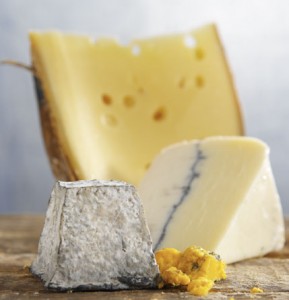Don’t get me wrong, I am not a libertarian. I think government restrictions are a good thing in certain cases — like big businesses, carbon emissions, killing people, etc. I do not think of the government as a big faceless entity whose sole purpose is taking away my rights. I do have one issue, though, in which I’d gladly take up arms in order to fight the menace of government overregulation: my cheese.
The U.S. Food and Drug Administration (FDA), as you might already know, is a branch of the government concerned with making sure that the aspirin we pop isn’t tainted with LSD and our Easy-Mac does not contain any traces of baby tears. All in all, I’m pretty darn neutral on the whole organization. But for some reason, they seem to be honing in on the sale of all raw milk and raw milk-based products.
If one ventures over to the FDA’s website, one will find scary Soviet propaganda-esque warnings about all the possible evil bacteria that you could get from unpasteurized milk. According to the FDA, queso fresco can kill your baby, and your grandmother’s favorite brie just might be the end of her. The FDA has also put forth a ban on the interstate sale of raw milk products, although the extent to which raw milk can be sold — and otherwise distributed — remains up to the individual state laws, much to their dismay.
Why is the FDA so concerned with us eating pasteurized products? Are soft stinky cheeses really a menace to our society? Well, according to the FDA, 800 individuals in the United States have gotten sick from ingesting raw milk products since 1998. Let’s do some math now. That’s 800 people in 13 years, which averages out to about 60 people a year. When you consider that some of the tastiest and most popular cheeses are made exclusively from raw milk, that is a ridiculously low statistic. My guess is that you’re much more likely to get gastrointestinal upset from a panda bowl or hot dog at a Red Wings game then you are from a fancy bleu cheese. The European Union states that raw milk products are “safe for human consumption” and doesn’t limit their sale at all, and I haven’t seen a mass extinction of Europeans yet.
But Hayden, you say, I understand that I am statistically very unlikely to become sick from eating tasty, unpasteurized cheese, but why not completely reduce the risk and avoid unpasteurized cheese altogether? My answer would be because most unpasteurized cheeses are, as I said before, tasty! Cheeses made from raw milk include brie, asiago, pecorino, comte, manchego, chedder, etc. One of the most delicious examples of a raw milk cheese, Roquefort, is required by European law to be made from unpasteurized milk in order to bear the name at all.
Okay, you admit, you have sold me on the idea of raw milk cheeses, but do you suggest that the government do absolutely nothing to warn the public of the potential dangers? No, I am not saying that at all.
I propose that the FDA uses its power to educate people of the realities and the specific dangers of raw milk. Instead of banning the sale and distribution of raw milk products throughout the U.S., why doesn’t the FDA simply require an informative warning sticker on all raw milk products so people can make their own choices about what to eat?
Just as there are warnings about the danger of consuming raw meat to those who are pregnant, elderly or immunocompromised in all establishments at which one might order a medium-rare steak, there should be warnings on unpasteurized milk products so that each individual can assess his or her own risk.
Perhaps this may be part of the larger problem of American obesity, since fresher food is more likely to contain potentially harmful bacteria. The FDA banning or over-regulating these items might encourage the public to stick with “safer” options such as processed cheese or, God forbid, Cheetos.
What I’m really trying to say, though, is that the FDA should do more informing and less scaremongering — Americans should pay more attention to their food and how it is made. And know, if you try to take away my Camembert, you are in for a world of pain.
Ford is a member of the class of 2013.


